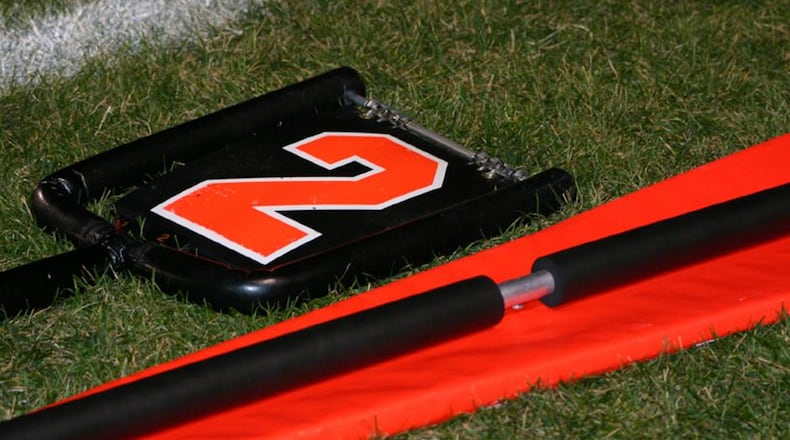GHSF Daily is expanding its Four Questions feature this season beyond head coaches to other voices in high school football. Today's interviewee is Joe Sturniolo, head football statistician for Westminster and the Atlanta Falcons. He previously was head football statistician for Georgia Tech (1995-2001) and Georgia (2002-14). Sturniolo will be the official statistician for Super Bowl LIII next year in Atlanta.
Joe Sturniolo, head statistician for Westminster and the Atlanta Falcons
1. How did you get your start in football statistics? "I got a phone call from Mike Stamus at Georgia Tech in 1992. In those days, the play by play that was distributed in the press box was typed manually. The typist, Ray Tapley, needed a spotter. My job was to watch the play, dictate what happened, and Ray put it in great play-by-play language. As part of that, I would keep notes for reference. After the games, I noticed my stats didn't always match the official stats, so I got a copy of the NCAA Statistician's Manual, started reading it and tried to learn the source of the discrepancies. When Tech's statistician retired, Mike offered me the job. I served as Georgia Tech's statistician for seven years.
"As for Westminster, my daughter started sixth grade there in the fall of 2000. I was already working for Georgia Tech and the Falcons, so I went to meet Gerry Romberg, the head coach at Westminster. I showed him a typical postgame stat package and told him I could do it for him. He asked what it cost, and I told him, 'A team shirt, maybe a hat.' He hired me on the spot, and I have been with Coach Romberg ever since, for 161 of his 200 victories, more than any other assistant coach he has had." [A former high school soccer player, Sturniolo eventually got the additional job as Westminster's kicking coach. He has helped develop several Division I kickers and punters, including Harrison Butker of the Kansas City Chiefs.]
2. Many people don't realize that high school statistics are not official. Neither the GHSA nor the national federation mandates or supervises stat keepers. Do you have concerns about the quality of high school stats? "My concern is the lack of training and oversight of those keeping stats. In the NFL, we have a 37-page manual on how things are recorded - seven pages just on fumbles - and every one of my calls is reviewed in New York. In the NCAA, there is also a manual for statisticians. If the teams have a concern, calls can be reviewed by the NCAA. In high school, it's a bit like the Old West, everyone doing their own thing. Therefore, unless I know the background of the person keeping the stats, I tend to be wary, not because I think statisticians are inflating numbers, but simply because they don't know the rules."
3. What are some typical high school scoring mistakes? "Tackles: There is a maximum of two players on a play. And while there is an element of judgment, the tackler must have had a significant role in stopping the runner. Too many high school tackles are JOP (jump on pile). Sacks: Sacks are included in tackles for loss. Yards negated by penalty: This always confuses statisticians unfamiliar with the manual. For example, line of scrimmage is the 50. Runner gains yards to the 30, but there was a holding penalty on the play. The holding call was at the 50, and it is enforced back to the 40-yard line. Some statisticians give the running back the 20 yards he gained. Others deduct the 10 yards lost. Neither are correct. The runner gets credit to the point of the enforcement. Since there was no positive yardage to the spot of the foul, the entire play is negated, no rush, no rushing yards.
"There are plenty of other scoring anomalies: A player can get credit for a receiving touchdown without ever catching the ball. A blocked punt is never charged to the punter, but to the team. A QB taking a knee or spiking the ball is not charged with a rush or a pass in the NCAA, but he is in the NFL."
4. What does it take to be a good statistician, and is there such a thing as one having a great game? "I have been told, 'Wow, you're an NFL statistician? You must be really good in math.' All of the math I need to be a statistician I learned in elementary school: addition, subtraction, multiplication and division. I have a degree (and a job) in advanced analytics, and that has nothing to do with keeping stats. What is far more important is knowing the rules, both the game rules and the statistical rules.
"As for big stat moments, a fellow statistician and I were talking about that one night, and my wife chimes in, 'You have nothing to do with who wins or loses the game.' I told her that was true, but we have a lot to do with who gets credit for it!"
Produced by Georgia High School Football Daily, a free e-mail newsletter. To join the mailing list, click here.
About the Author
The Latest
Featured

